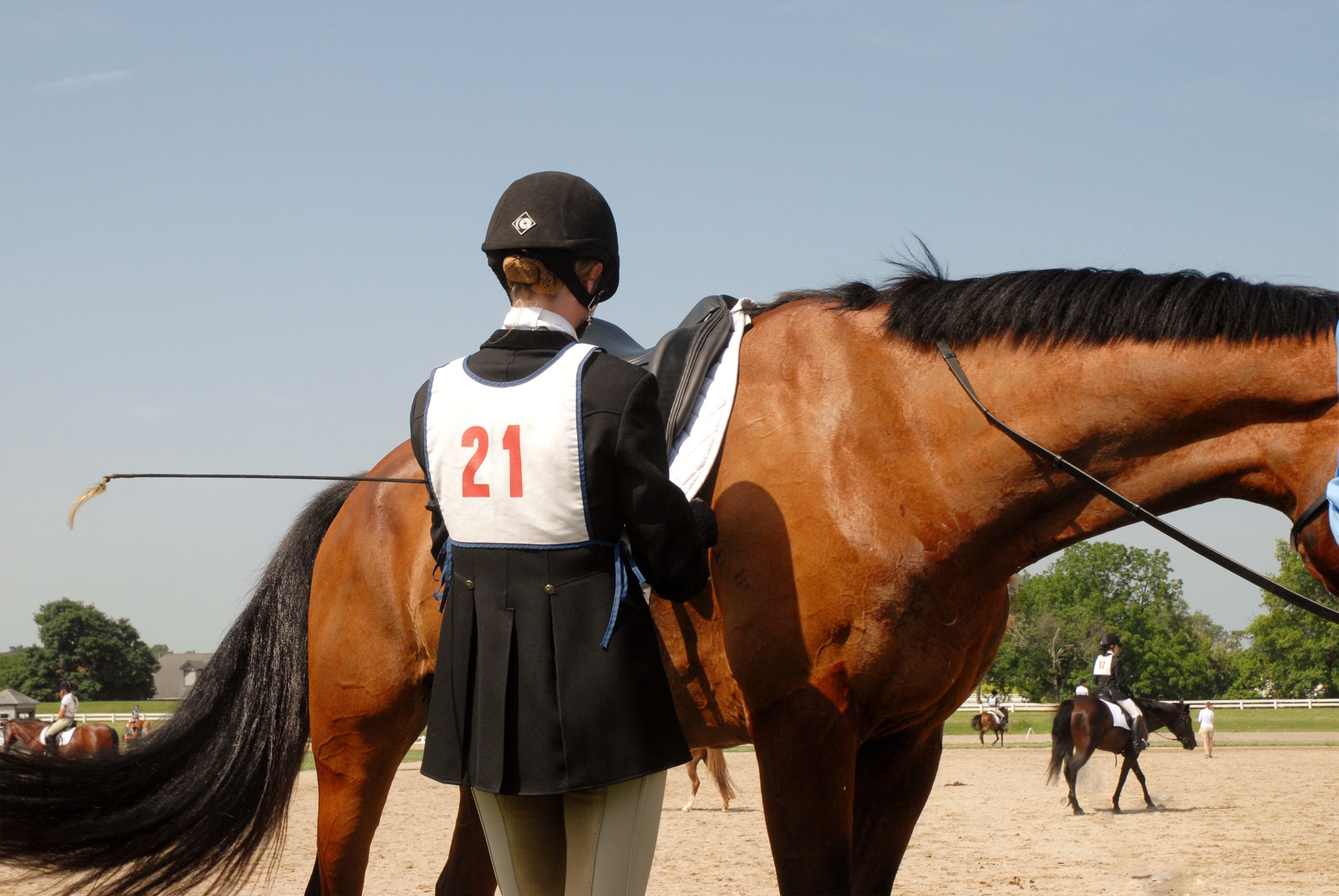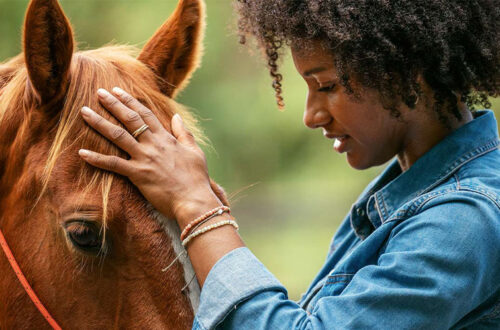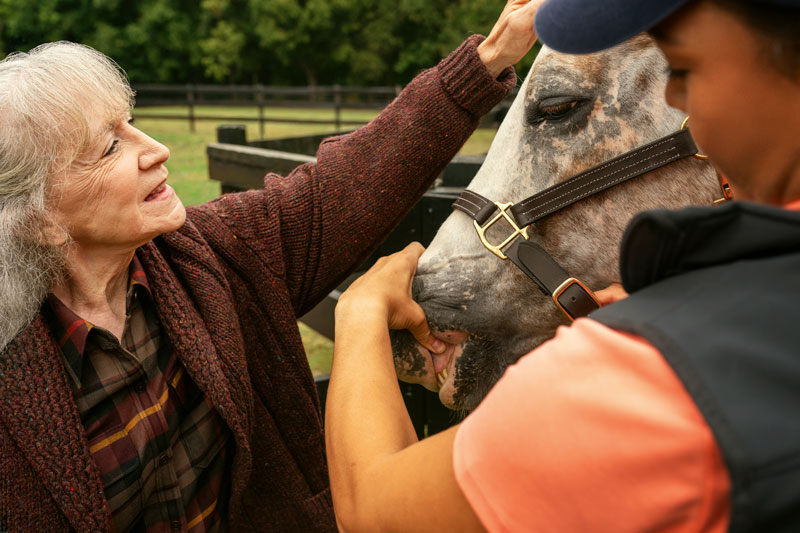
Spring Tune-Up: 5 Wellness Tips for Your Horse
By Jacquilin Boggs, DVM, MS, Dipl. ACVIM
Whether you ride for pleasure or performance, spring is an exciting time that offers a fresh new start. We know your horse is like family, so as with any family member, an annual wellness exam helps provide proactive and preventative health care. Below are five spring tune-up tips to discuss with your veterinarian at your horse’s next visit.
1. Schedule an Annual Wellness Exam
Wellness visits help affirm how your horse is doing, as well as allow you to check in with your veterinarian to make any medication/supplement adjustments that set horses up for a healthy, active season ahead.
Routine bloodwork and additional diagnostic tests can provide peace of mind or notify you of potential issues that your veterinarian can watch or further investigate. Your veterinarian can also teach you how to take your horse’s vital signs in case of an emergency and offer advice for stocking up on a first-aid kit.
- A diagnostic tool to discuss with your veterinarian is testing levels of Serum Amyloid A (SAA), which is a biomarker for identifying early signs of inflammation due to infection and other issues.1
o A hand-held, stall-side tool can help detect possible infection in horses in the time it takes your
veterinarian to perform a physical exam—no need to wait for mail-away lab results.
o This test provides an extra layer in decision-making confidence for your veterinarian as it has
been shown to be 30 times more sensitive than a thermometer at detecting infection.
o This tool is also useful when identifying infection in broodmares and during newborn foal
exams to screen for early signs of inflammation caused by infection. And the test can be run
with the same blood sample as IgG when testing their immunity levels.
o Testing SAA helps to identify a problem—before it becomes a problem—while aiding in
a biosecurity plan to set up prevention and protection protocols as needed. - Your veterinarian can help prepare your horse for upcoming travels by ensuring their Coggins test and core and risk-based vaccines are up to date.
- Lastly, insulin, adrenocorticotropic hormone (ACTH), and glucose levels should be monitored for at-risk patients or for horses that are currently being treated for a metabolic disorder.
2. The Perfect Pair: Core and Risk-Based Vaccines
Now is the ideal time to help protect your horse against both the core and risk-based diseases as recommended by the AAEP. Core vaccines are recommended for all horses no matter where they live or how old they are and protect your horse against the five potentially fatal equine diseases—rabies, tetanus, West Nile virus, Eastern and Western equine encephalitis.
Risk-based vaccines are recommended by your veterinarian based on the likelihood or “risk” that your horse may be exposed to those infectious diseases, due to show schedule, travel, location and season. The most common risk-based vaccines are: equine influenza virus (EIV or Flu) and equine herpesvirus 1 & 4 (EHV or Rhino). How your horse is vaccinated, and with what, is important when it comes to the immune response. Studies showed up to a 4.7-time higher immune response when equine influenza virus is given separately from the core diseases versus in a large combination vaccine that contain an all-in-one.

Equine influenza is highly contagious and capable of traveling 150 feet through the air.2 This means that your horse can be exposed to EIV across the distance of half a football field—it is transmitted via aerosol or from horse-to-horse through direct contact with contaminated fomites (materials that can carry surviving infectious particles), such as hands, clothing, brushes, buckets, stall walls, feed troughs, trailers, and more.
Set horses up for disease protection, no matter the horse’s work or recreational discipline, through your vaccination program, as advised by your veterinarian.
3. Grazing Season = Deworming Season
Parasite transmission increases with the beginning of grazing season. Talk with your veterinarian about running a fecal egg count, as well as their recommendation for a spring dewormer based on your horse’s age/life stage, fecal egg count, and your geographic zone.
- Experts recommend less frequent, yet targeted, deworming practices (to avoid potential parasitic resistance), based on a horse’s age/life stage and geographic zone.3
- Additional deworming resources:
o For Foals: Choose pyrantel pamoate and/or oxibendazole for the critical treatment of ascarids
(roundworms) in young foals.
o For One- to Two-Year-Olds: The AAEP’s Parasite Control Guidelines advise that one- to two-
year-olds should be treated like high shedders, with a focus on small strongyles and
tapeworms.
o For Adult Horses: According to the AAEP’s Parasite Control Guidelines, moxidectin is the
experts’ treatment of choice against small strongyles.3
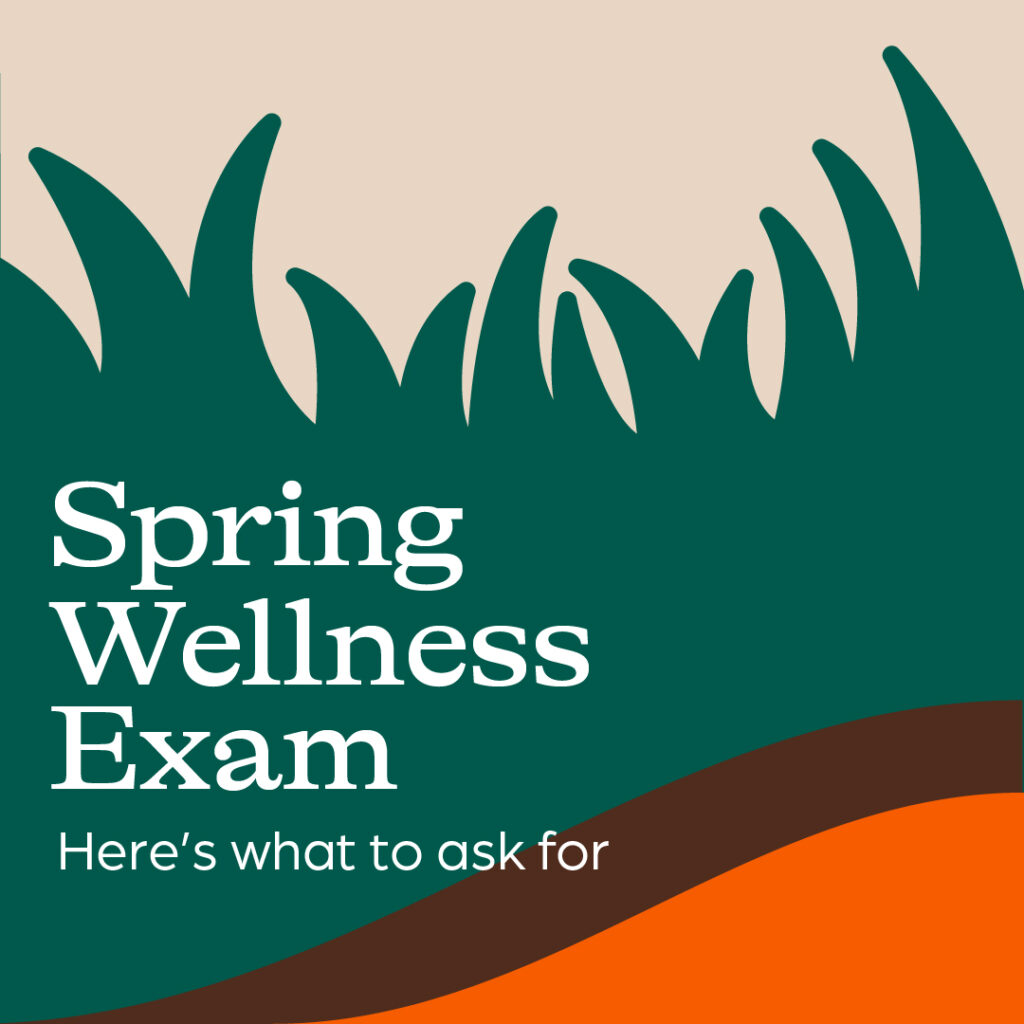
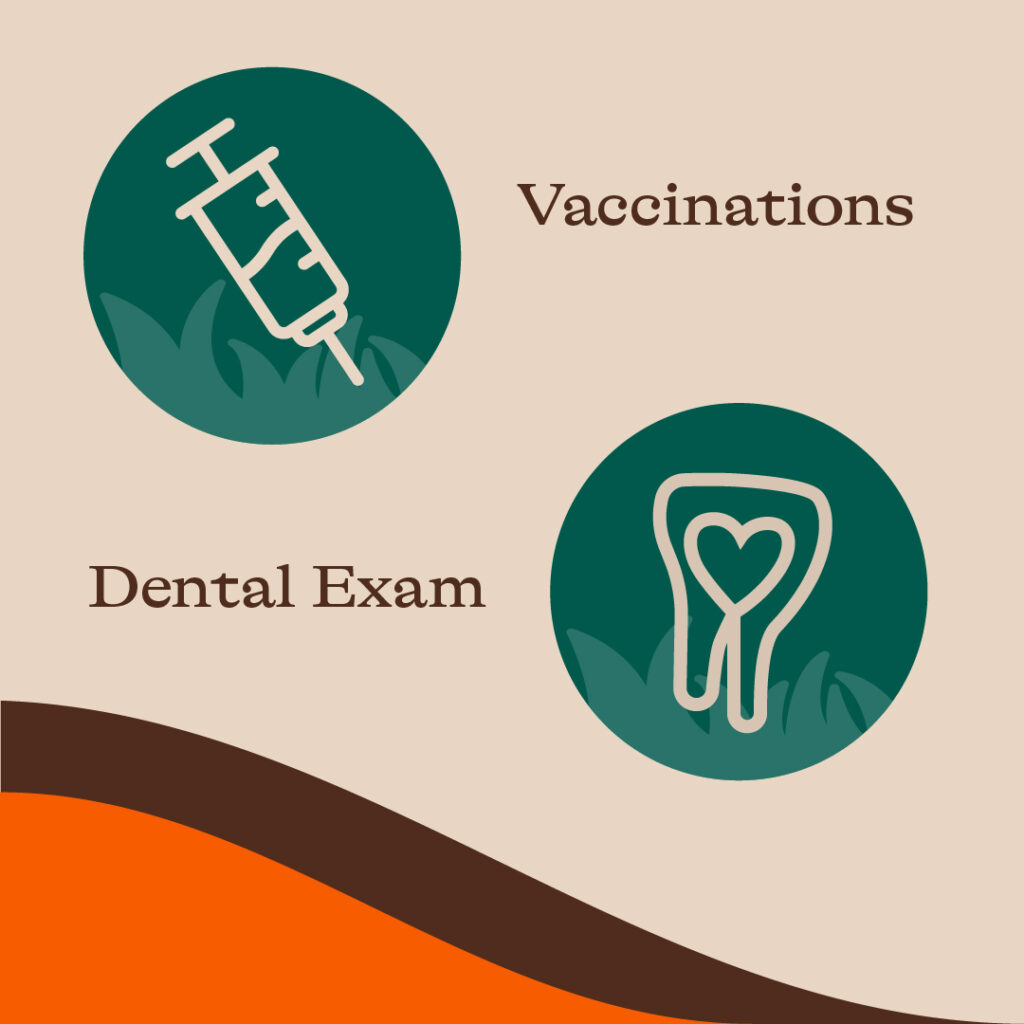
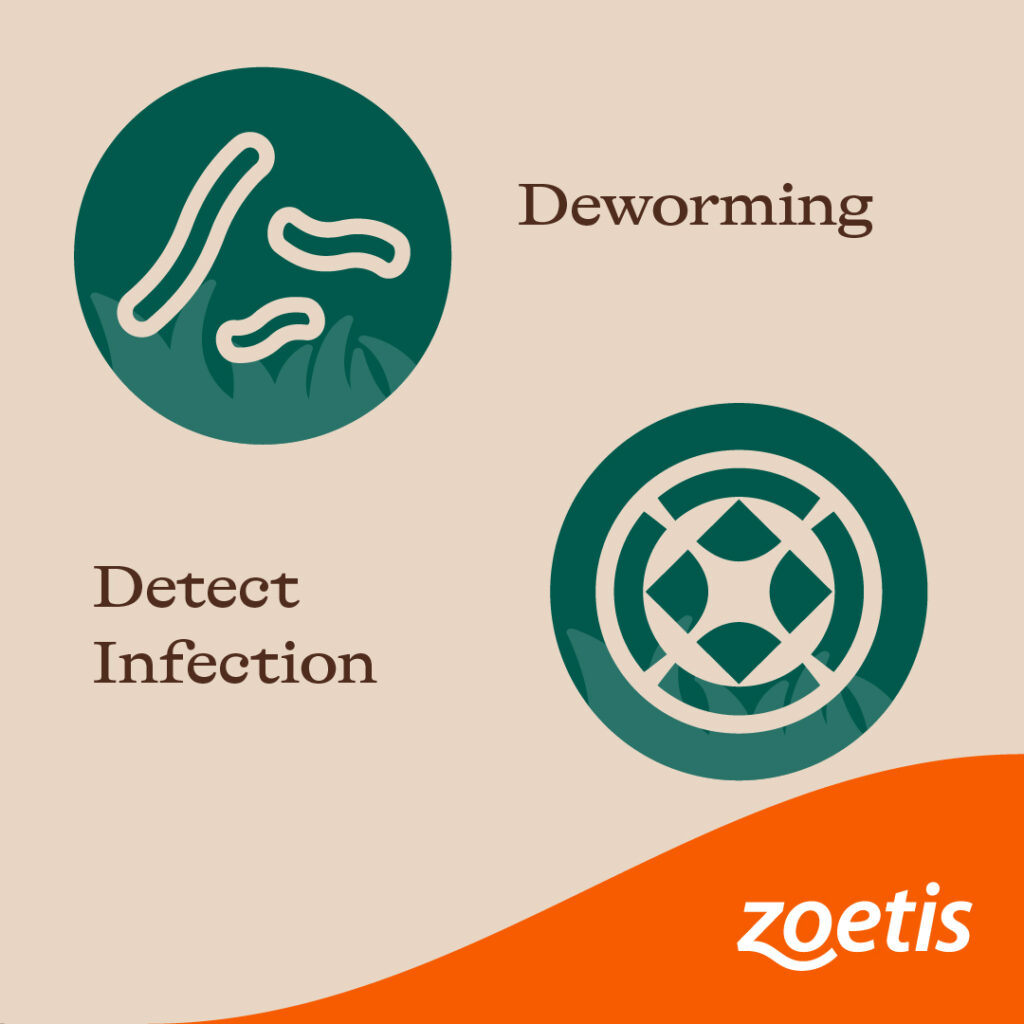
4. The Importance of Dental Health
Sharp enamel points (hooks), uneven tooth wear (wave mouth), missing teeth and other issues can interfere with a horse’s ability to chew food correctly, which can impact their weight and gastrointestinal health. Including a sedated oral exam with a mouth speculum during your horse’s spring wellness check-up can help your veterinarian pinpoint potential issues preemptively.
- Routine annual preventative dental exams can help mitigate potential health issues, including but not limited to choke and behavior or performance issues.4 Some horses, those that are under five years old and senior horses (over 15 years old), may require dental care more than once per year. Speak with your veterinarian to see if this is recommended for your horse.
- A standing sedated exam—using a mouth speculum—is the only way to provide a thorough and complete oral exam to reach the furthest back cheek teeth. In most states, this can only be performed by a licensed veterinarian.
- Detomidine hydrochloride is an ideal sedative and analgesic for facilitating routine dental exams and procedures and is the #1 vet trusted sedative.5
5. General Body Condition Score
You might have noticed, some older horses tend to lose weight in the cooler months, which may very well go unnoticed, especially if they wear a blanket most of the winter.
Ensure that you remove your horse’s blanket routinely for grooming and to assess their general body condition. Have your veterinarian provide recommendations on nutrition and supplementation, as well as overall condition and lameness. A routine evaluation before the upcoming season is a valuable part of wellness check-ups for nearly every horse, no matter their discipline.
Schedule a Spring Wellness Visit
Call your local veterinarian today to schedule your horse’s five-point wellness tune-up to set them up for a healthy, successful riding and pasture season. For additional information, visit ZoetisEquine.com.
References
- Oertly M, Gerber V, Anhold H, et al. The accuracy of Serum Amyloid A in determining early inflammation in horses following long-distance transportation by air. AAEP Proceedings. 2017:460-461.
- Equine Disease Communication Center. Equine influenza disease factsheet. https://aaep.org/sites/default/files/Documents/Outside%20Linked%20Documents/DiseaseFactsheet_EquineInfluenza_FINAL-Cobranded.pdf. Accessed January 3, 2023.
- American Association of Equine Practitioners. AAEP parasite control guidelines. https://aaep.org/guidelines/parasite-control-guidelines. Accessed January 3, 2023.
- Pehkonen J, Karma L, Raekallio M. Behavioral Signs Associated with Equine Periapical Infection in Cheek Teeth. J Equine Vet Sci 2019;77:144-50.
- Freedom of Information Summary. NADA 140-862.

About Zoetis— Official USPC Equine Health and Wellness Partner
To learn more about how Zoetis is making lives better for horses and those who care for them, visit zoetisequine.com and Zoetis Equine on Facebook and Instagram.



